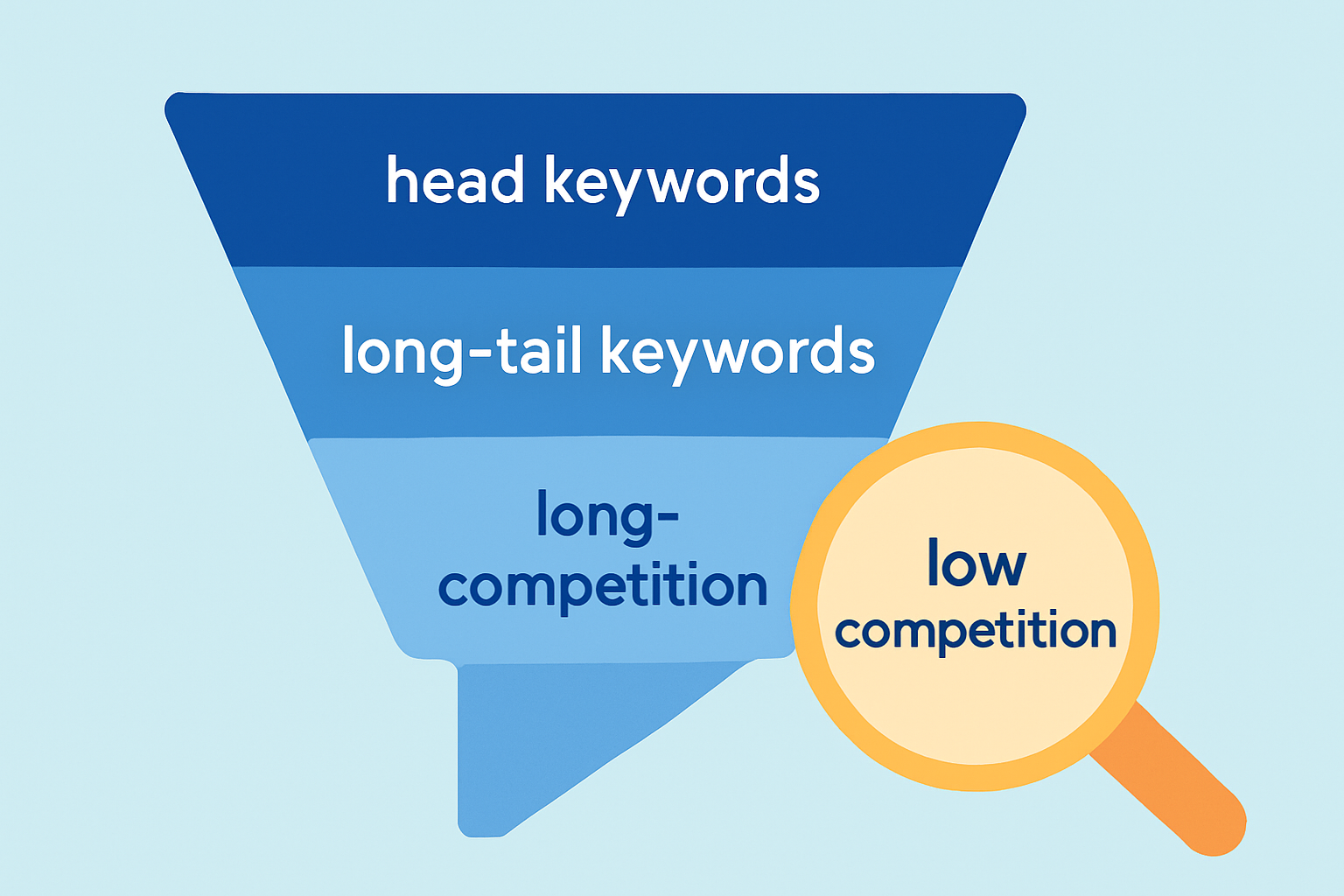
Top Internet Archive Alternatives for Data Preservation
Discover the best internet archive alternatives tailored for different budgets and data preservation...

This guide breaks down the smartest ways to spot and use low competition keywords for faster, smoother SEO wins.
Keyword research really forms the backbone of any successful SEO and digital marketing strategy. Getting the hang of spotting low competition keywords can be a game changer. It helps marketers reel in targeted niche traffic without wasting time and resources.
Keyword competition basically boils down to how tough it is to climb the ranks for a specific search term on those ever-picky search engines. This level of competition isn’t just a number. It plays a starring role in shaping your content strategy by guiding how much effort and resources you’ll need to invest and giving you a rough idea of how long the uphill battle might last.
Going after low competition keywords comes with quite a few perks. More often than not you’ll see faster rankings and improved organic click-through rates. You also get a better chance to connect with niche audiences who might otherwise be overlooked. Plus it tends to bring down the costs of paid campaigns and makes content creation less of a headache.
Finding low competition keywords successfully calls for a clear process that blends detective work, thoughtful analysis and careful validation. Starting with broad seed keywords, you sift through various tools and metrics while paying close attention to user intent and competition.
Start hunting down some broad seed keywords that tie into your niche or industry—think of it as casting a wide net to see what bites.
Next, lean on keyword research tools to brainstorm keyword ideas while getting the scoop on competition and search volume data.
Check out competition metrics like Keyword Difficulty, CPC and Domain Authority for those top-ranking pages—it’s like peeking over the fence to size up the neighbors.
Keep the user intent in mind for each keyword to make sure it aligns with what your content is aiming for.
Zoom in on keywords that usually fly under the radar with low competition and still bring in a nice chunk of search volume.
Double-check your picks by scanning the current SERP results and taking a good look at the quality of the competitor content—better safe than sorry.
Keyword research tools play a important role in uncovering competition scores that make choosing the right keywords a bit less like shooting in the dark. They provide a treasure trove of details—everything from search volume and competition levels to relevance and backlink quality—giving marketers the kind of confidence that comes from knowing they’re picking keywords with genuinely lower competition.
| Tool | Key Features | Competition Metrics Provided | Pricing (per month) | Best Use Case |
|---|---|---|---|---|
| Google Keyword Planner | Delivers keyword volume, competition forecasts, and handy keyword suggestions that can get you off the ground | Competition index (low/medium/high) | Free | Perfect for PPC advertisers and beginners dipping their toes into keyword research |
| Ahrefs | Brings keyword difficulty scores, backlink profiles, and in-depth SERP analysis to the table | Keyword Difficulty, Domain Rating | Starting at $99 | Tailored for seasoned SEO pros who love hunting competitive keywords like a pro |
| SEMrush | Handles keyword research, competitor insights, and PPC data all in one place | Keyword Difficulty, CPC, SERP features | Starting at $119.95 | Great choice for those crafting a seamless mix of SEO and PPC strategy |
| Moz Keyword Explorer | Zooms in on keyword difficulty, organic click-through rates, and detailed SERP analysis | Keyword Difficulty, Domain Authority | $99 - $249 | Ideal for SEO specialists laser-focused on content creation and link building |
| Ubersuggest | Serves up keyword ideas, search volume, and competition insights without burning a hole in your wallet | SEO Difficulty, PPC Difficulty | Free / $29 Premium | A solid pick for small businesses and budget-conscious marketers alike |
| Keywords Everywhere | A quick browser extension that pops up instant volume, CPC data, and competition alerts when you need them | Search volume, CPC, competition alerts | $10+ (credits based) | Super handy for those moments when you need a fast reality check on keywords |
Understanding competition metrics inside and out is absolutely key when it comes to picking the right low competition keywords.
User intent is essentially the why behind someone typing a search query. Nailing the right low competition keywords that match specific user intent types—whether informational, navigational, transactional or commercial investigation—not only helps your content deliver spot-on answers but also sparks meaningful engagement and boosts your SEO.
Techniques like competitor keyword gap analysis and long-tail keyword targeting can uncover hidden gems you might otherwise miss.
Competitor analysis is basically taking a good, hard look at your main rivals’ keyword profiles to spot those hidden gems they haven’t quite nailed down yet—especially ones with low competition. By digging into what they’re rocking and where they’re dropping the ball, you can uncover golden opportunities to plug those gaps and whip up content that outshines them.
Long-tail keywords are those longer, more specific phrases that usually see lower search volumes but come with far less competition. This combo makes them a real gem for attracting targeted traffic.

Diagram illustrating the relationship between broad keywords and more specific long-tail keywords with lower competition.
Validation is the step that ensures the low competition keywords you choose aren’t just shiny distractions but actually have real traffic potential and fit snugly with your goals. It’s a hands-on process—think digging into the quality of the search results and sizing up how tough your competition really is. You also double-check that those keywords line up with your business objectives.
Take a good hard look at the current SERP results to get a real feel for what kind of content is topping the charts and how fierce the competition is.
Check out the Domain Authority and Page Authority of the leading pages—this gives you a clear picture of the uphill battle you might face.
Crunch the numbers on potential traffic by weighing search volume against how likely people are to click through.
Think carefully about how relevant the keyword is to your audience and whether it fits your larger content game plan.
Make important keywords that find the sweet spot between competition, search volume and what your business is aiming for because striking the right balance is key.
A lot of marketers tend to fixate solely on search volume, often missing the key user intent lurking behind those keywords. Some breeze past a thorough SERP analysis or chase after ultra-low competition keywords that hardly ever deliver meaningful traffic—usually ending up with wasted time and disappointing returns.
Balancing the competition level of keywords with what users genuinely want and what fits your business like a glove is really at the core of lasting SEO success. I have noticed too often that marketers chase after low competition keywords without stopping to see if those terms actually line up with their overall strategy." — SEO Expert
Incorporating low competition keywords into your content planning and SEO efforts is like planting seeds in fertile soil—it plays a vital role in nurturing steady, organic growth over time.
Kick things off with solid research to uncover a blend of low-competition keywords that fit your niche.
Review these keywords carefully using trusted tools like Moz Keyword Explorer and Mangools’ KWFinder plus some SERP sleuthing.
Craft targeted high-quality content thoughtfully optimized around the keywords you’ve chosen. Focus on quality over quantity every time.
Regularly monitor your rankings and organic traffic because it’s the best way to identify what’s working and adjust what’s not before issues arise.
Every few months revisit your keyword strategy to find fresh opportunities and keep up with shifting search trends like a pro.

Discover the best internet archive alternatives tailored for different budgets and data preservation...

Finding the perfect images is easier than ever with the best search engines. Explore top platforms,...

Explore top Ahrefs alternatives like Moz and Mangools to find affordable, user-friendly SEO tools ta...

Unlock the power of video content with top video search engines tailored for keyword research. Disco...